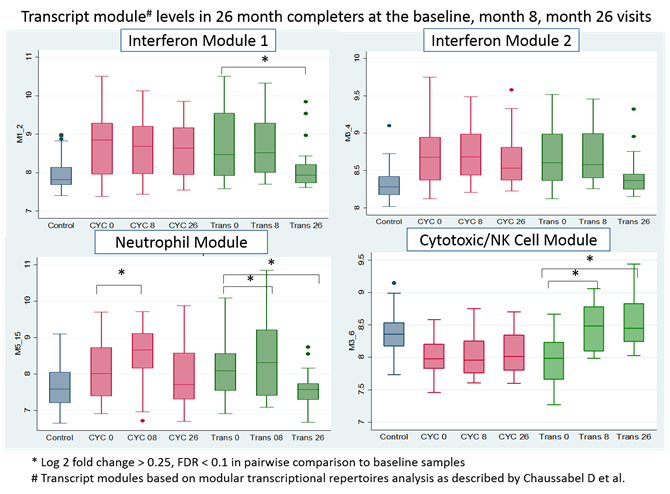Session Information
Date: Sunday, October 21, 2018
Title: 3S089 ACR Abstract: Systemic Sclerosis & Rel D/O–Clinical I: Clinical Trials I (898–903)
Session Type: ACR Concurrent Abstract Session
Session Time: 2:30PM-4:00PM
Background/Purpose:
Myeloablation followed by autologous hematopoietic stem cell transplantation (HSCT) led to improved clinical outcomes compared to 12 monthly infusions of cyclophosphamide (CYC) in patients with severe diffuse systemic sclerosis (SSc) in SCOT trial1. Global molecular studies in SSc patients undergoing HSCT have not been reported. Herein, we suggest that HSCT leads to changes in SSc related immune signatures after immune recovery at 26 month visit at the whole blood RNA and serum protein levels.
Methods:
Sixty-two SCOT participants (HSCT= 27, CYC = 35) and 62 -matched controls were investigated. Whole blood global transcript profiling and determination of 102 serum proteins in concomitantly collected serum samples were performed. All available samples at pretreatment baseline (n=62), 8 months (n=46), and 26 months (n=35) post-randomization were included.
Results:
This subset of SCOT participants had a mean disease duration of 2.2 years and 93.5% of them had interstitial lung disease.
At the baseline visit, two interferon (IFN) and one neutrophil transcript modules were upregulated and the cytotoxic/NK module was down-regulated in comparison to controls. A paired comparison of the 26-month to the baseline samples revealed a significant decrease of the IFN and neutrophil modules and significant increase in the cytotoxic/NK module after HSCT but no significant change compared to baseline in the CYC recipients (Figure). Moreover, comparison of 26-month samples in the HSCT arm to healthy controls no longer showed upregulation of IFN or neutrophil modules or downregulation of cytotoxic/NK module. A decline in the IFN and neutrophil modules was associated with an improvement in lung volumes and an increase in the cytotoxic/NK module correlated with improvement in the skin score at 26-month (Table).
Serum proteins correlating with the IFN and neutrophil transcript modules were identified. The serum protein IFN and neutrophil composite scores also decreased significantly at 26 months after HSCT (fold change (FC)=0.8, p <0.001; FC=0.85, p=0.003) while similar changes were not observed in the CYC arm at 8 or 26 months, confirming the gene expression level findings at the protein level.
Conclusion:
In this first multilevel, global molecular study of HSCT in SSc, HSCT recipients contrary to CYC recipients had significant changes in SSc molecular signatures at both the RNA and serum protein levels at Month 26. The results at Month 26 provide an interim look, but need to be validated at the Month 54 primary endpoint.
1. Sullivan KM et al. NEJM 2018; 378:35-47
|
Table: Correlation of percent change in transcript modules with percent change in clinical outcome |
||||
|
Transcript module |
FVC% |
mRSS |
||
|
r |
p |
r |
p |
|
|
M1.2 (IFN) |
-0.43 |
0.012 |
0.12 |
0.5 |
|
M3.4 (IFN) |
-0.39 |
0.023 |
0.06 |
0.745 |
|
M5.15 (neutrophil) |
-0.37 |
0.035 |
0.03 |
0.853 |
|
M3.6 (Cytotoxic/NK cell) |
0.14* |
0.4334* |
-0.53* |
0.0014* |
|
Abbreviations: FVC%: Forced vital capacity% predicted; mRSS: Modified Rodnan Skin Score * Spearman’s Rho was used for this analysis |
||||
To cite this abstract in AMA style:
Assassi S, Wang X, Ying J, Keyes-Elstein L, Goldmuntz E, Turner J, Zheng W, Chen G, Pascual MV, Varga J, Hinchcliff M, Bellocchi C, McSweeney P, Furst DE, Nash R, Crofford L, Welch B, Pinckney A, Mayes MD, Sullivan K. Changes in the Systemic Sclerosis Molecular Signatures after Myeloablation Followed By Autologous Hematopoietic Stem Cell Transplantation and Their Clinical Correlates [abstract]. Arthritis Rheumatol. 2018; 70 (suppl 9). https://acrabstracts.org/abstract/changes-in-the-systemic-sclerosis-molecular-signatures-after-myeloablation-followed-by-autologous-hematopoietic-stem-cell-transplantation-and-their-clinical-correlates/. Accessed .« Back to 2018 ACR/ARHP Annual Meeting
ACR Meeting Abstracts - https://acrabstracts.org/abstract/changes-in-the-systemic-sclerosis-molecular-signatures-after-myeloablation-followed-by-autologous-hematopoietic-stem-cell-transplantation-and-their-clinical-correlates/

